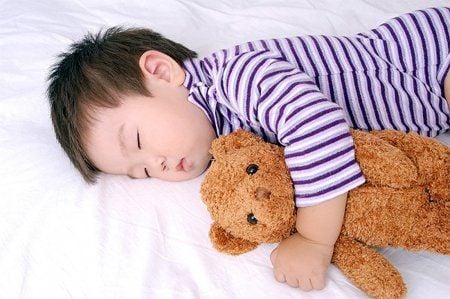This is an automatically translated article.
The article is professionally consulted by Master, Doctor Nguyen Minh Tuan - Pediatrician - Pediatrics - Neonatology - Vinmec Danang International General HospitalDepending on the age that children have different sleep time each day, the sleep time for babies can be up to 16 hours/day. Lack of sleep, not getting enough sleep will directly affect the health and development of children.
1. The importance of sleep for children
According to The Guardian, putting children to bed has a significant impact on children's behaviors. Research conducted on 10,000 children in the UK shows that babies with irregular bedtimes are more likely to have behavioral problems, including: hyperactivity, difficulty expressing emotions . These symptoms are similar to fatigue after a long flight.Disorganized sleep over a long period of time has obvious effects on children by disrupting circadian rhythms leading to sleep deprivation. This will gradually sabotage the brain development as well as the ability to regulate certain behaviors in young children.
Professor Yvonne Kelly, Department of Epidemiology and Public Health, University College London, said: “The early stages of development have an impact on health throughout life. Irregular sleep time will impair physical and mental health, adversely affect healthy development and daily activities of children. So, erratic bedtimes, especially at critical times for development, can have long-term effects on a child's health later in life."
Research has also found that children who have irregular bedtimes or go to bed after 9pm have a poorer social background and are more likely to form bad habits.
Trắc nghiệm: các chỉ số cần chú ý về sự phát triển thể chất của trẻ
Chiều cao, cân nặng của bé ở từng giai đoạn nên là bao nhiêu là bình thường, bao nhiêu là bất thường? Cùng ThS.BS Ma Văn Thấm điểm lại xem bạn đã nắm được các chỉ số phát triển thể chất của bé chưa nhé!The following content is prepared under supervision of Thạc sĩ, Bác sĩ y khoa, Ma Văn Thấm , Nhi , Phòng khám Đa khoa Quốc tế Vinmec Dương Đông(Phú Quốc)
2. Enough sleep time for children
Children from 1 to 4 weeks: Newborns need to sleep about 15-18 hours a day, each sleep usually lasts from 2 to 4 hours. However, for premature babies, the amount of sleep may be longer, and those with colic may sleep less. At this stage, because babies have not yet formed their own biological clocks, sleep often does not follow a day-night cycle. This is the period when children need the most sleep. Children from 1 to 4 months: Need 14-15 hours of sleep every day. When babies are 6 weeks old, they usually sleep a little less. However, sleep time is longer and lasts from 4 to 6 hours, often tends to sleep more in the evening. Children 4 months to 1 year old: At this stage, ideally, babies should sleep 15 hours a day, but in reality, babies under 11 months old usually only sleep about 12 hours a day. This is the most important period to train children to form a healthy sleep habit because at this time, children have begun to socialize more and sleep cycles also begin to resemble adults. Children under 6 months usually sleep about 3 times during the day, and decrease to 2 times when the baby is 6 months old. In the morning, children usually start sleeping at about 9 o'clock and last until about 10 o'clock. Afternoon, which starts around midday until about 2 p.m., and sleeps for about an hour or two. In the afternoon, children can start sleeping from about 3-5 hours. By the age of 6 months (in some babies, even earlier), the baby's physical development is already established and is capable of sleeping through the night. Children from 1-3 years old: Need 12-14 hours of sleep every day. By the time a child is 1 year old, morning sleep will gradually disappear and usually only have a nap in the afternoon during the day. When your baby is learning to walk, ideally they need 14 hours of sleep a day, but in reality they only get about 10 hours of sleep. In most children aged 21 to 36 months, naps are still needed and the duration ranges from 30 minutes to an hour. Children usually start sleeping at 7-9pm at night and wake up around 6-8am. Children from 3 to 6 years old: Need about 10-12 hours of sleep every day. At this stage, children usually begin to sleep at night from about 7 to 9 pm and wake up around 6 to 8 am. From the age of 3 onwards, most children are still napping, but by the age of 5, most children no longer nap. The shorter the nap time, the better for the baby. From the age of 3 onwards, most children have formed their sleep habits. Children from 6 to 12 years old: At this stage, children have had activities at school, society and family, so children will often start sleeping earlier at night. At night, they usually start sleeping at 9pm and wake up around 7-10am. At this stage, children need to get enough sleep from 9 to 12 hours a day. However, if a child only sleeps an average of about 9 hours a day, it is enough. Children 12 years and older: Need 7-11 hours of sleep every day. At this stage, children have more activities, so sleep is very important to regain health. However, with the pressure of studying, many children do not get enough sleep every day. Therefore, parents need to pay more attention to their children's sleep.
=>> Useful advice from the Neonatal Pediatrician of Vinmec International General Hospital:
Find the right sleep training method for your baby The secret to nurturing a good night's sleep for your baby
3. How do children have good sleep?
Children should be trained to have a habit of going to bed early and at a set time, in order to give them a resting reflex, to help them fall asleep easily in any condition.Minimize external as well as internal stimuli on the child's nervous system during sleep. The most important thing is to avoid noise and light because they make the baby's sleep not deep and easy to wake up. In addition, other factors such as leaving the child hungry or eating too full, not cleaning the body, clothes that are too tight, lying in the wrong position, a dirty and cramped sleeping place all adversely affect the sleep of the child. young.
It is necessary to avoid psychological trauma such as making children inhibited before going to bed (such as threatening, shouting, telling scary stories, showing horror movies...). In case the child has diarrhea, urinates while sleeping, should gently clean and put the child to sleep, do not scold.
Letting children have fun, full gentle body movement also contributes to deeper sleep. When a child has trouble sleeping, parents can use soothing words to induce suggestions such as "close your eyes and sleep well, dear mother" or: "close your eyes and sleep well"... to help the child walk easily. into sleep.
Each child will have a different need for sleep duration, length and depth. Parents need to create all conditions for children to sleep fully, should not wake up early. Usually, when the baby gets enough sleep, the baby will wake up automatically without having to call.
In case the child has a sleep disorder (such as insomnia for several nights in a row, sleepwalking), parents need to take the child to a doctor, do not use sleeping pills without consulting a doctor.
Put the child to bed while the child is still awake, do not coax the child to sleep before putting him in bed.
Blankets, pillows will help children reduce the feeling of lack of parents.
Slowly cut off night feeding, usually 6 months old baby can get enough energy during the day.
Avoid giving children caffeine-containing foods in the evening such as chocolate (According to pediatrics what to know, Pediatric Secrets).
Sleep takes up 1/3 of a person's life, therefore, the importance of sleep has been shown. And for children, especially children in the developing age, sleep should be more concerned and cared for by parents. Adequate sleep, right sleep will help children get a deep and quality sleep, making their physical and mental development in the best way.

Children who do not eat properly are at risk of micro-mineral deficiency causing anorexia, growth retardation, malabsorption,... If they notice the above signs, parents should supplement their children with products. The supplement contains lysine, essential micro-minerals and vitamins such as zinc, chromium, selenium, and B vitamins to help fully meet the nutritional needs of children. At the same time, these essential vitamins also support digestion, enhance nutrient absorption, help improve anorexia, and help children eat well.
Parents can learn more:
Signs of zinc deficiency in children
Micronutrient deficiency and failure to gain weight in children
Please regularly visit Vinmec.com website and update useful information to take care of your child. Take care of the baby and the whole family.











![[Video] How to take care of children in summer?](/static/uploads/small_20190730_112639_927206_cham_soc_tre_mua_he_max_1800x1800_png_7a3b48f9f3.png)



